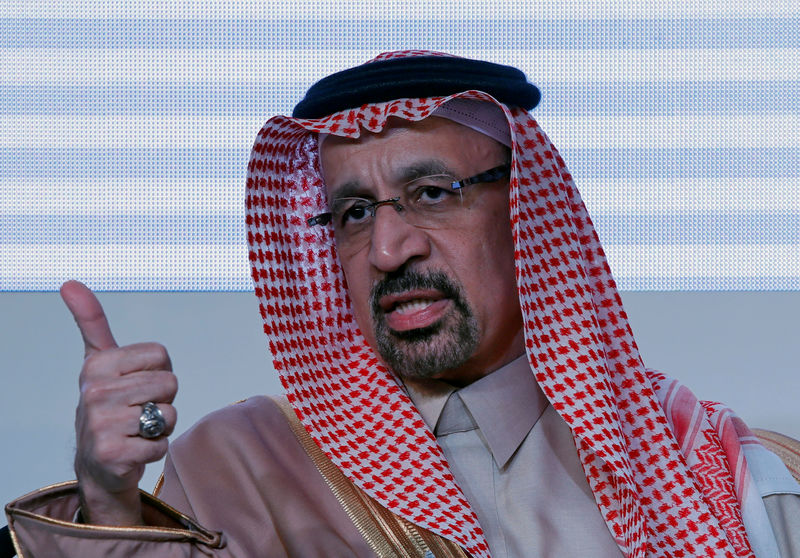By Rania El Gamal and Stephen Kalin
RIYADH (Reuters) - The Saudi energy minister on Monday said it was premature to say whether a consensus existed among OPEC and its allies to extend oil supply cuts but a meeting next month would be key.
A joint OPEC and non-OPEC ministerial committee known as the JMMC is due to meet in May. Saudi Arabia and Russia are members of the panel, which includes other major oil producers that took part in a global supply-cutting agreement last year, such as Iraq, the United Arab Emirates, Kuwait, Nigeria and Kazakhstan.
"JMMC will be a key decision point because we will certainly by then know where the consensus view is and, more importantly, before we ask for consensus, we will know where the fundamentals are pointing," said Saudi energy minister Khalid al-Falih.
"I think May is going to be key," he added.
Oil inventories remain higher than average but the market is on its way toward rebalancing, Falih said.
"I don't think we will need (to do more) ... the market is on its way toward balance. We have done a lot more than others," he added, referring to the possibility of Saudi Arabia cutting output further below its target under the global deal.
"We are getting to a stage where inventories are starting to stabilize and come down but still significantly above what I would consider a normal level."
Russia, which is cutting oil output in tandem with OPEC, also said production cuts would stay in place at least until June, when Washington's next steps on reducing Iranian and Venezuelan oil exports become clearer.
NO CHANGE IN TRADING CURRENCY
The United States has been increasing its own crude exports steeply and U.S. President Donald Trump has been pressing OPEC to lower the oil price by boosting production.
U.S. policies targeting Iran and Venezuela have introduced a new level of uncertainty for OPEC as the producer group struggles to predict global supply and demand. Washington is also advancing a bill, known as NOPEC, that could expose OPEC members to U.S. antitrust lawsuits.
The NOPEC move prompted Saudi Arabia to threaten to sell its oil in currencies other than the dollar if Washington passes the bill, three sources familiar with Saudi energy policy told Reuters last week.
However, the kingdom's energy ministry on Monday said the report was “inaccurate” and does not reflect its position on the matter.
"The Kingdom has been trading its oil in dollars for decades, which has served the objectives of its financial and monetary policies well,” the ministry said in a statement.
It added that Saudi Arabia would not risk its key policy priority -- as a stabilizing force for global energy markets -- through a fundamental change to the financial terms of oil trading in its relationships around the world.
Falih also told reporters at an oil event in Riyadh that there was no change to the kingdom's policy of trading oil in U.S. dollars.
"Absolutely not. There is no change whatsoever to our long-standing policy," Falih said.
The United Arab Emirates' energy minister, Suhail bin Mohammed al-Mazroui, also said that the use of the dollar as the main oil-trading currency could not be changed overnight.
